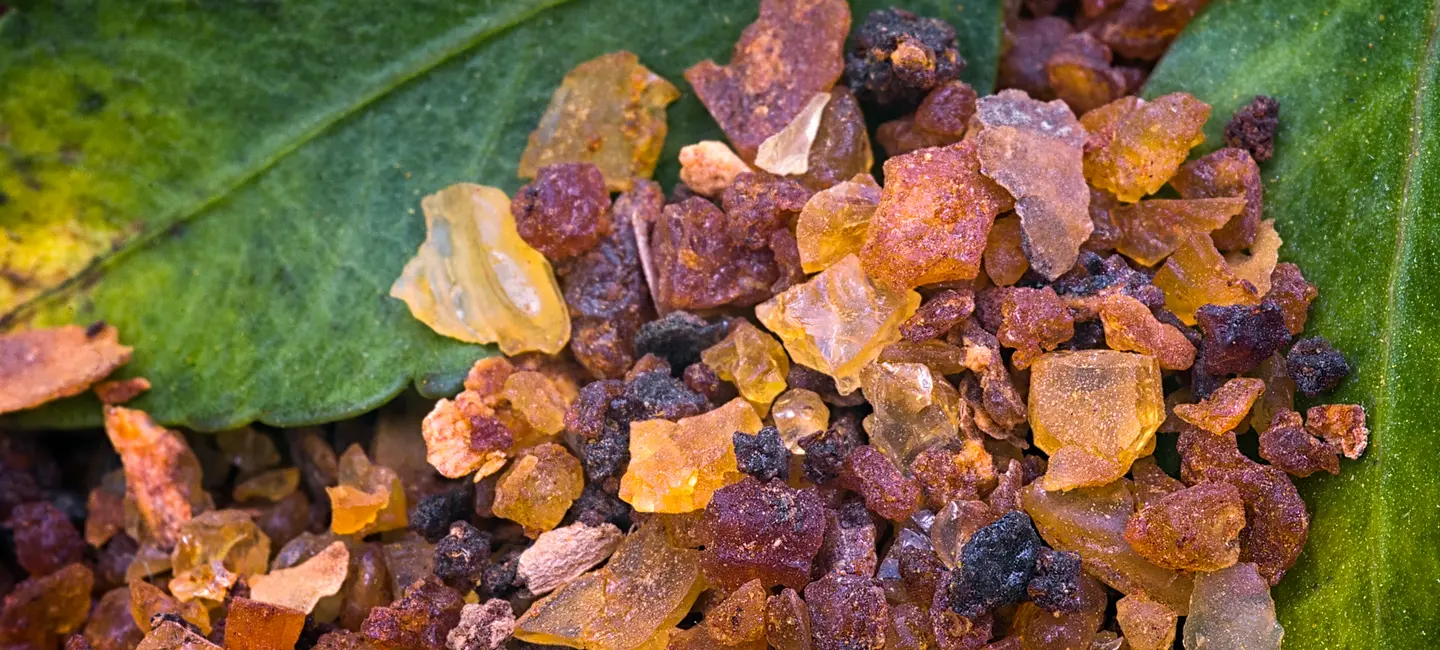
Myrrh is a yellow, fragrant, sap-like resin that comes out of cuts in the bark of certain Commiphora trees, including the Commiphora myrrham tree.
Myrrh contains chemicals that might reduce pain and kill bacteria. It's used worldwide but is especially popular in China and Egypt.
People use myrrh for back pain, diarrhea, parasite infections, wound healing, and many other conditions, but there is no good scientific evidence to support these uses. There is also no good evidence to support using myrrh for COVID-19.
Don't confuse myrrh with guggul. These are related but not the same.
Is It Effective?
NatMed Pro rates effectiveness based on scientific evidence according to the following scale: Effective, Likely Effective, Possibly Effective, Possibly Ineffective, Likely Ineffective, Ineffective, and Insufficient Evidence to Rate.
- A disease caused by parasitic worms (schistosomiasis). Taking myrrh by mouth does not help treat this infection in adults or children.
There is interest in using myrrh for a number of other purposes, but there isn't enough reliable information to say whether it might be helpful.
Is it Safe?
When taken by mouth: Myrrh is commonly consumed in foods as a flavoring agent. Myrrh is possibly safe when used as medicine in doses of 400 mg three times daily for up to 12 months. It's usually well-tolerated. But taking large doses of myrrh is possibly unsafe. Doses greater than 2-4 grams can cause kidney problems and heart rate changes.
When applied to the skin: Myrrh is possibly safe for most people. It's been used safely in a diluted bath for up to 7 days. It might cause a skin rash in some people.
Special Precautions & Warnings:
Pregnancy: Myrrh is likely unsafe when taken by mouth during pregnancy. Myrrh can stimulate the uterus and might cause a miscarriage. There isn't enough reliable information to know if myrrh is safe to use on the skin when pregnant. Stay on the safe side and avoid use.
Breast-feeding: There isn't enough reliable information to know if myrrh is safe to use when breast-feeding. Stay on the safe side and avoid use.
Surgery: Myrrh might affect blood sugar levels. This might interfere with blood sugar control during and after surgery. Stop using myrrh at least 2 weeks before a scheduled surgery.
Medications for diabetes (Antidiabetes drugs)
Interaction Rating=Moderate Be cautious with this combination.
Myrrh might lower blood sugar levels. Taking myrrh along with diabetes medications might cause blood sugar to drop too low. Monitor your blood sugar closely.
Warfarin (Coumadin)
Interaction Rating=Moderate Be cautious with this combination.
Warfarin is used to slow blood clotting. Taking myrrh might decrease how well warfarin works to slow blood clotting. This could increase the chance of blood clotting.
Herbs and supplements that might lower blood sugar: Myrrh might lower blood sugar. Taking it with other supplements with similar effects might lower blood sugar too much. Examples of supplements with this effect include aloe, bitter melon, cassia cinnamon, chromium, and prickly pear cactus.
There are no known interactions with foods.
Myrrh extract has most often been used by adults in doses of 600-1200 mg by mouth daily for up to 12 months. It's also been applied to the skin in various products, including mouthwash and bath solution. Speak with a healthcare provider to find out what type of product and dose might be best for a specific condition.
Abyssinian Myrrh, African Myrrh, Amyris kataf, Arabian Myrrh, Bal, Balsamodendron Myrrha, Balsamodendrum habessinicum, Balsamodendrum myrrha, Bdellium, Bol, Bola, Commiphora, Commiphora abyssinica, Commiphora erythraea, Commiphora habessinica, Commiphora kataf, Commiphora madagascariensis, Commiphora molmol, Commiphora myrrha, Common Myrrh, Didin, Didthin, Gomme de Myrrhe, Gum Myrrh, Heerabol, Hemprichia erythraea, Mirra, Mirrh, Mo Yao, Murrah, Myrrh Gum, Myrrha, Myrrhe, Myrrhe Africaine, Myrrhe Amère, Myrrhe d'Arabie, Myrrhe Bisabol, Myrrhe Douce, Myrrhe de Somalie, Myrrhe du Yémen, Opopanax, Resina Commiphorae, Somalien Myrrh, Yemen Myrrh.
Information on this website is for informational use only and is not intended to replace professional medical advice, diagnosis, or treatment. While evidence-based, it is not guaranteed to be error-free and is not intended to meet any particular user’s needs or requirements or to cover all possible uses, safety concerns, interactions, outcomes, or adverse effects. Always check with your doctor or other medical professional before making healthcare decisions (including taking any medication) and do not delay or disregard seeking medical advice or treatment based on any information displayed on this website.
© TRC Healthcare 2024. All rights reserved. Use and/or distribution is permitted only pursuant to a valid license or other permission from TRC Healthcare.
